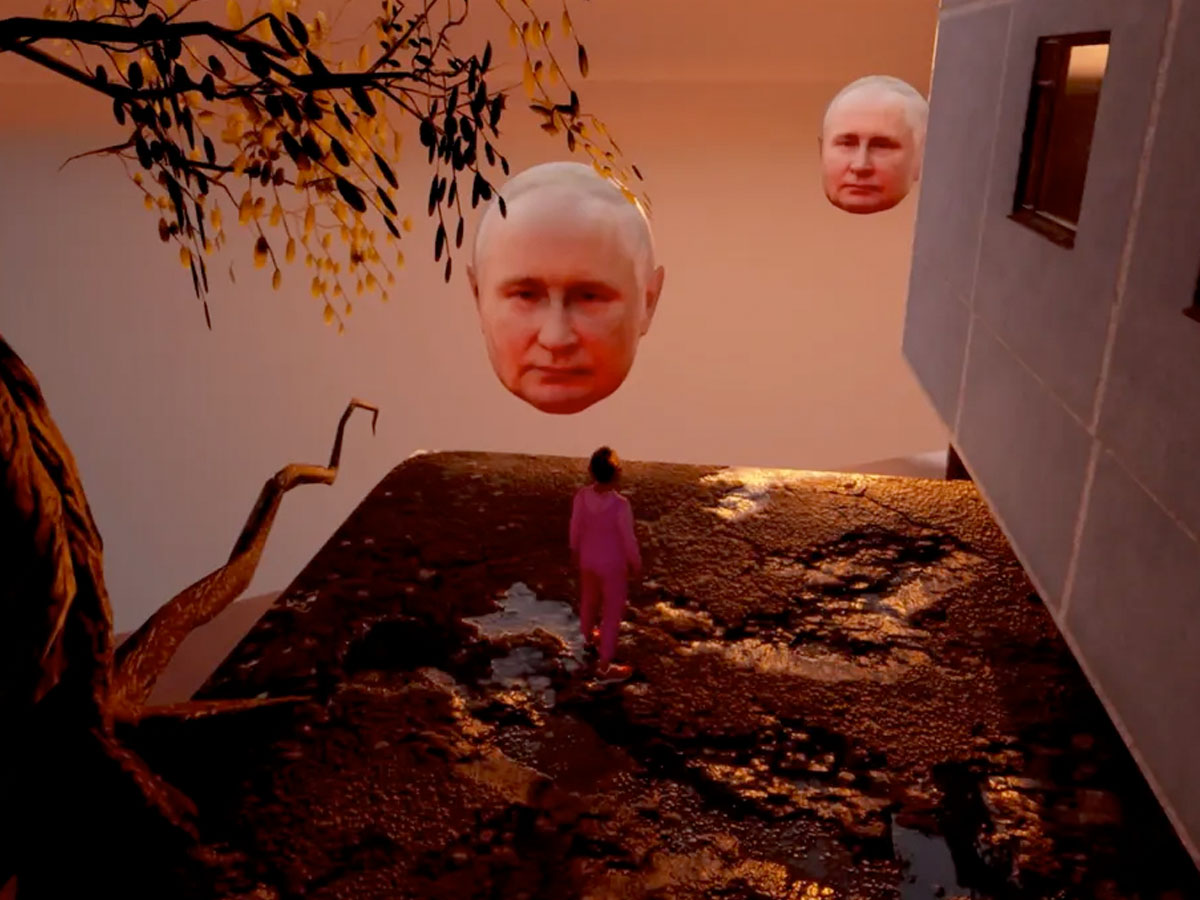
Dreams About Putin
Since the Russian invasion of Ukraine, many Russians have started having dreams about their president and sharing them on social media. In Dreams About Putin, a selection of these dreams have been brought to life using Unreal Engine, a 3D graphics program for creating scenes for computer games.
Ever since Putin’s army invaded Ukraine in 2014, I and many other Russians living in Western countries have become translators and moderators tasked with explaining the situation. By far, the most frequent questions I get asked are: “Do Russians agree with this?” and “What are they doing against it?”, to which the most straightforward answers are: “No.” and “Nothing”. While that may confuse Western citizens, in Russia, a distaste for the government and political passivity do not contradict each other. Generations have lived through dictatorship, learning by force that their voice does not matter and that resistance is not only futile but, at times, impossible.
However, the 2023 hybrid animated documentary Dreams About Putin shows that though many Russian citizens are not vocally against it, they are not unaffected by the war either. The terror has permeated their subconscious and haunts them at night. Activist Daria Serenko, founder of the Feminist Anti-War Resistance and member of the notorious “foreign agents” list of public enemies published by the Russian government, noticed a surge of dreams involving Putin being shared online and began documenting them. She was inspired by similar collections created in times of great national distress—most prominently in the 1966 book The Third Reich of Dreams—all of whom share a distinctive characteristic: those living under terror do not dream of revenge or freedom but rather relive the horror they experience during the daytime.
Such is the state of Russian citizens: constant terror, state brutality, and censorship have turned desperation into submission. Those who dare to resist get punished swiftly and harshly. Wearing black in solidarity with Ukraine gets you arrested. Posting anti-war sentiments on social media gets you fired. Standing alone or in a group on the street gets you prosecuted.
The dreams selected by directors Korkia and Fishez from Serenko’s collection are all tales of dejection and hopelessness. One woman dreams of hiding in a bunker with Putin, wondering if he might not be as bad as she suspected, only to be confronted with a host of half-naked models who have been summoned to have sex with him. Another one dreams of being Putin’s wife, locked inside the Kremlin and hearing people being tortured in the basement.
The visuals are only loosely associated with the voice-over narration, pushing the surrealism of each dream even further. Korkia and Fishez use the distinct visual language of the Unreal Engine, a software initially developed for video game design that creates 3D graphics wavering between photorealism and uncanny valley. Suitably, each dream feels like a level in a game with no apparent rules or objectives. An inquisitive camera watches as blank-faced figures sleepwalk through glitchy surroundings, perplexed by everything but reacting to nothing. In one of the most powerful sequences of the film, a child is pursued by floating Putin heads. She jumps over the edge of a cliff to escape, only for it to be revealed that her whole world is a giant Putin head. Her face remains blank as she plunges into nothingness. Nothing horrible surprises Russians anymore.
Maybe this harsh reality is so unbelievable to Westerners because, in the post-Soviet 1990s and 2000s, Russia pretended to be a modern country. Everything unimaginable beforehand now seemed possible: owning private capital, travelling internationally, buying Big Macs. Even democracy had a trial run under Yeltsin until he almost lost the 1996 presidential elections. Among rumours of corruption and voter fraud, the government decided that Russians could not be trusted with the power of their vote. A “promising young man” was plucked from relative obscurity, equipped with a plagiarised PhD title, and pushed through the political ranks to terrorise the world and haunt his nation.
Putin’s presence in the film is misleadingly innocent. In the dreams, he is stooped and puppy-eyed, looking as confused as his fellow citizens. In the propaganda footage that follows each animated sequence, his presence is just as surreal. Eerily alone and childishly bemused, he performs a series of masculine hobbies fitting the alpha male personality: hang gliding, spearfishing, and hiking, all done with great success and a serene facial expression. Though this kind of propaganda seems less frightening than war zone footage, to those living under Putin’s reign, it might be more triggering. “Look, your war criminal dictator enjoys the little things in life!”. The light-heartedness of these vignettes mocks the dreamers’ suffering.
Dreams About Putin is a deceptively simple film. On the surface, it is an associative animation and collage—a loose interpretation of people’s dreams paired with found footage. However, in the context of the current state of the world, it gives a valuable insight into the mental state of the Russian people—their desperation and resignation. There is no escaping Putin, not even at night.
Dreams About Putin is part of Film Fest Gent’s Belgian Student Film Competition this week.

